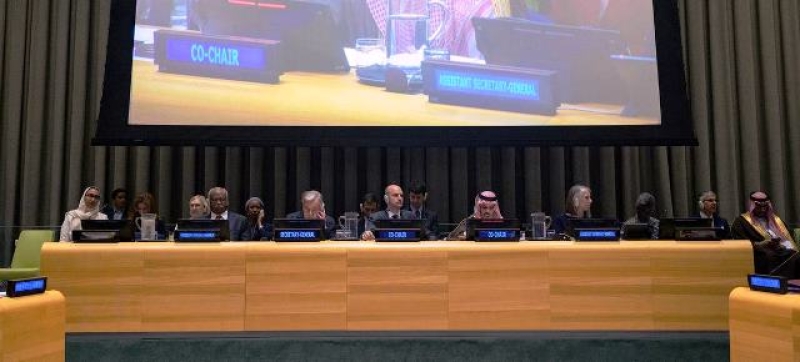- India Sees 9% Drop in Foreign Tourists as Bangladesh Visits Plunge |
- Dhaka Urges Restraint in Pakistan-Afghan War |
- Guterres Urges Action on Safe Migration Pact |
- OpenAI Raises $110B in Amazon-Led Funding |
- Puppet show enchants Children as Boi Mela comes alive on day 2 |
Int’l confce on Two-State Solution resumes its first plenary

Ministerial meeting ahead of the high-level international conference. UN Photo-Manuel Elías
The High-Level International Conference for the Peaceful Settlement of the Question of Palestine and the Implementation of the Two-State Solution resumes its first plenary meeting today (Tuesday).
Co-chaired by the Ministers for Foreign Affairs of France and Saudi Arabia, the Conference is being held pursuant to General Assembly resolution 79/81 to advance the implementation of UN resolutions pertaining to the question of Palestine and the two-State solution.
Earlier on Monday (July 28) Mr. Guterres warned that the two-State solution is “farther than ever before,” amid ongoing conflict, deepening occupation, and the absence of a credible political horizon.
He condemned both the 7 October Hamas attacks and what he described as the “obliteration” of Gaza, including mass civilian casualties, starvation and destruction of infrastructure.
The UN chief urged world leaders to ensure the conference becomes a turning point for irreversible progress toward a two-State solution, calling it the only credible path to peace based on international law.
Anita Anand, Minister for Foreign Affairs of Canada, said that her country is pledging an additional $10 million in 2025 to accelerate reform and capacity-building for the Palestinian Authority.
She also urged support for a principled humanitarian response through “organizations with a proven capacity to deliver humanitarian assistance at scale”. Canada is the third-largest bilateral donor in response to this crisis, and she announced another $30 million “in new money this year for civilians in Gaza”.
“This will allow more aid to be pre-positioned in Jordan and the region and ready to be delivered at scale,” she said, adding: “The Government of Canada will be present with humanitarian aid, and we will play a leading role in building bridges to more aid for Gaza with our international partners.”
Mohammad Ishaq Dar, Deputy Prime Minister and Minister for Foreign Affairs of Pakistan, said that Gaza today is “a graveyard of international law and humanitarian principles”. Israel’s blockade of aid and deliberate targeting of civilian infrastructure “have crossed every red line of legality and humanity”, he stressed.
“Collective punishment must stop now,” he underscored, adding that it is “high time for credible and enforceable international action on an immediate, unconditional and permanent ceasefire” across the Occupied Palestinian Territory. Also underlining the need to reinvigorate a “genuine” political process to end the occupation and realize a two-State solution, he said that the Palestinian question is “a test case for the United Nations and the world”.
For its part, Pakistan is prepared to contribute to the building of Palestinian institutions and to any international protection mechanism that is created. He concluded: “We must give hope to the Palestinian people.”
“We have been waiting for long years for a genuine international intervention that would move us towards a peaceful, just and comprehensive solution to the Palestinian question,” said Mohammed Mustafa, Prime Minister of the State of Palestine. He stressed: “In this period of waiting, we have lost what we have lost, and we have suffered immensely.”
He therefore urged that this conference be “a turning point in which positions and declarations are translated into immediate and unprecedented practical steps to stop the genocide and end the Israeli occupation”. The world must act to stop the aggression, starvation and displacement, and send a clear message: “Enough disregard for the life and dignity of Palestinians — Palestinians are human beings," he said.
He added that, for its part, the State of Palestine is ready to invite a “temporary Arab and international support force”, through a Security Council resolution, to protect the Palestinian people, ensure a ceasefire and support Palestinian Government and security services — “and not as a substitute for it”.
“For decades, Middle East diplomacy has been far more process than peace,” observed UN Secretary-General António Guterres. Words, speeches and declarations have little meaning to those on the ground as “destruction and annexation bulldoze ahead”, and he stressed that “the obligation is on all of us to prove that this effort is something different”.
He urged: “Let us reject the false choice between Palestinian statehood and Israeli security — there is no security in occupation.” Rather, Israel’s legitimate security concerns must be addressed, he said — “and so must the legitimate rights of the Palestinian people”.
“We cannot wait for perfect conditions — we must create them,” he added.
“France is ready to fully recognize the State of Palestine, and will do so in the month of September,” declared Jean-Noël Barrot, Minister for Europe and Foreign Affairs of France. This recognition, he said, is both an expression of rejection and an appeal.
It rejects the idea that the “war camp is winning over the peace camp”, and rejects Hamas’ contestation of Israel’s right to exist, he said, adding: “It is also a rejection of allowing the extremists in Israel to say that the Palestinians have no right to exist.”
This recognition, he added, is an appeal to all people and countries of the world to “bring your contributions to this edifice of peace”. – UN News

